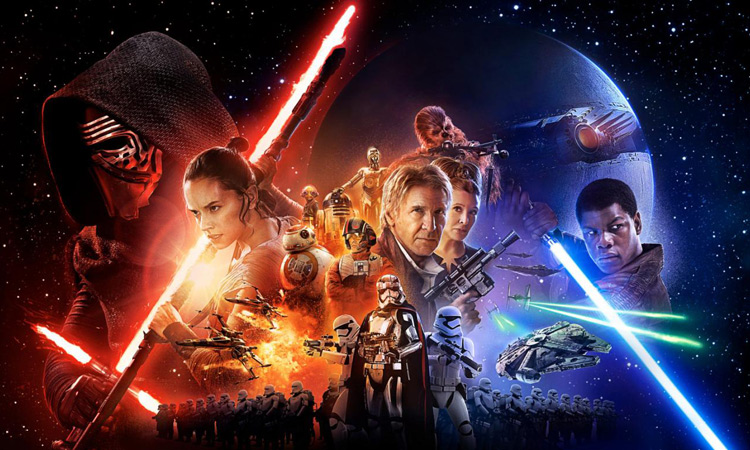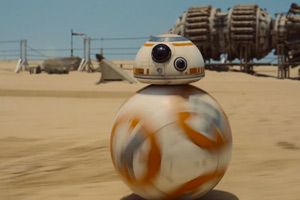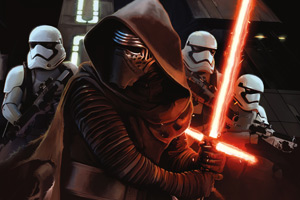
Let’s get this out of the way first: Star Wars: The Force Awakens is about as good a variation on the familiar theme as we could realistically hope for, evoking the character depth, epic backdrops, and genuine pathos that those of us who grew up with the saga remember. The fact that such depth and pathos may not actually exist in the films themselves, but more in the projections of our childhood memories, is not to suggest that they’re not good movies. They shaped many of us—my early sense of physical perspective was deeply connected to the fact that my toy Obi-Wan was far too big for my plastic Star Destroyer; deeper still, observing Han and Leia’s screwball-serious dance may have been my first exposure to mythic notions of romantic love. Beyond that, the movies—at least the original trilogy—are immensely fun; at their best, sweeping action adventures with heart, and an invitation to consider what their creator George Lucas calls “a soap opera … about family problems.”
The people behind The Force Awakens, director J.J. Abrams, who co-wrote along with Lawrence Kasdan and Michael Arndt; familiar cast members Harrison Ford (Han Solo), Carrie Fisher (Princess Leia), Mark Hamill (Luke Skywalker), along with the masked Anthony Daniels and Peter Mayhew as C-3PO and Chewbacca; and composer John Williams, have made a delicious, thrilling hybrid of everybody’s best intentions. What you remember is here: dry humor, elder wisdom figures, spectacular set pieces that feel real, the ambivalence of evil, and the weight of the galaxy on Luke’s shoulders.
And what you don’t expect is here too: giving the best possible platform to star-making performances from Daisy Ridley (Rey) and John Boyega (Finn) means that it’s a woman-dominated hero’s journey, with a non-white partner who is much more than a sidekick. This is Star Wars doing something new. The minority report? Well, the same illogic as before applies to the planet-exploding weapon (if its owners want to rule the universe, why only use it when they’re feeling particularly evil?); and the heroes are still capable of casual cruelty played for laughs. But those are small complaints— this is a tremendously entertaining film, more than just fun, but with something to say about being a person in the world in which we live.
 The first words in the famous screen crawl are such a knowing surprise that I won’t spoil them; suffice to say, something has been lost, and the point of The Force Awakens is to find it. Finn’s AWOL stormtrooper (the second time in Star Wars history that a bad guy developed a conscience) and Rey’s impoverished desert scavenger are thrown together with new droid BB-8 (as with R2-D2, here for both comic relief and a kind of life-saving wisdom). Soon taken under the wing of crusty Solo, they try to find what they’re looking for. This being Star Wars, an imperial army with Nazi overtones (a battle-rousing speech by Domhnall Gleeson looks like a colorized outtake from the Hitler propaganda film Triumph of the Will) stands in the way, accompanied by a mysterious dark figure with magic powers.
The first words in the famous screen crawl are such a knowing surprise that I won’t spoil them; suffice to say, something has been lost, and the point of The Force Awakens is to find it. Finn’s AWOL stormtrooper (the second time in Star Wars history that a bad guy developed a conscience) and Rey’s impoverished desert scavenger are thrown together with new droid BB-8 (as with R2-D2, here for both comic relief and a kind of life-saving wisdom). Soon taken under the wing of crusty Solo, they try to find what they’re looking for. This being Star Wars, an imperial army with Nazi overtones (a battle-rousing speech by Domhnall Gleeson looks like a colorized outtake from the Hitler propaganda film Triumph of the Will) stands in the way, accompanied by a mysterious dark figure with magic powers.
A kind of junior consultant in tyranny, Adam Driver’s Kylo Ren worships the memory of Darth Vader (and meditates on a creepy relic to prove it); but has deeper reasons for doing so than mere lust for power. While one character changes sides because “it’s the right thing to do”, Ren is divided. He feels “the call to the light”, but whatever violence exists inside him has not been tamed. It’s implied that this violence derives from family dysfunction, or at least the sins of the (grand) fathers. Kylo didn’t get where he is overnight; his backstory is one of several that will presumably be illuminated in future episodes.
And so the stage is set for a story ultimately about one thing: where are we at home, and how do we find it when we first must lose it? The characters in Star Wars have been negotiating with their sense of purpose for nearly 40 years now, resisting and accepting their calling, steeping away from and into their authenticity. “The belonging you seek is not behind you, but ahead,” a sage here offers a novice.
 For anyone feeling out of place or out of time (and who doesn’t, especially when they’re watching something that reminds them of how they used to feel about the world?), these words may turn out to contain the reason why The Force Awakens isn’t just lots of fun, but slightly wise. Of course it still contrives a moral universe in which might is right, and evil is defeatable only by killing it (I suppose there’s a reason they call it the “force” and not the “spirit of nonviolent resistance”). Though it falls short of the kind of startling imagination regarding heroes and villains shown recently in The Lego Movie and Inside Out (two magnificent films that would simply not exist without either Lucas’ visual sense or his summary of rites of passage stories), there’s more here to chew on than just X-Wing dogfights, comedy droids, and superficial mysticism. In providing its villains with comprehensible motivation, allowing for the possibility of enemies becoming friends, and even, in its most painful scene, forgiveness for the worst kind of violation, there’s something more here than just the repetition of the myth of redemptive violence.
For anyone feeling out of place or out of time (and who doesn’t, especially when they’re watching something that reminds them of how they used to feel about the world?), these words may turn out to contain the reason why The Force Awakens isn’t just lots of fun, but slightly wise. Of course it still contrives a moral universe in which might is right, and evil is defeatable only by killing it (I suppose there’s a reason they call it the “force” and not the “spirit of nonviolent resistance”). Though it falls short of the kind of startling imagination regarding heroes and villains shown recently in The Lego Movie and Inside Out (two magnificent films that would simply not exist without either Lucas’ visual sense or his summary of rites of passage stories), there’s more here to chew on than just X-Wing dogfights, comedy droids, and superficial mysticism. In providing its villains with comprehensible motivation, allowing for the possibility of enemies becoming friends, and even, in its most painful scene, forgiveness for the worst kind of violation, there’s something more here than just the repetition of the myth of redemptive violence.
It may sound like stretching a point, but the sense of genuine menace, and those epic, authentic-seeming backdrops (lush greens call to mind the Ewok planet Endor, and there’s enough ice and snow to rerun the opening battle sequence from The Empire Strikes Back) ground the story enough to make the emotional beats seem real too. The Force Awakens is indeed ultimately about how we discover ourselves in relationships, and a lot hinges on what appears to be the aftermath of a teenage tantrum. And this is where Star Wars is a little deeper than its reputation sometimes suggests. There’s not just adventure, pathos, and the joy of seeing characters we love resurrected, but a universe of gold and shadow in these family systems.
To find out about Rose’s thoughts on how to live a happier life, click here


